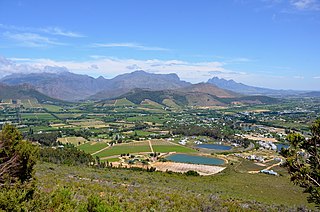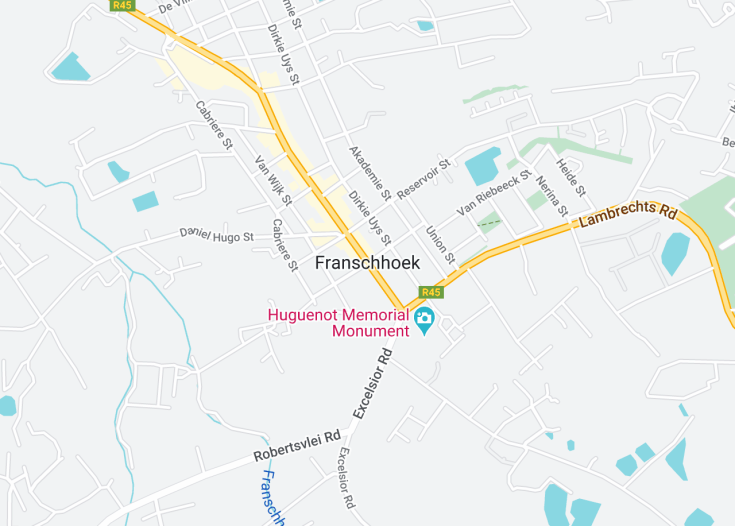Nestled in South Africa’s Western Cape, Franschhoek is a splendid display of cultural heritage and natural beauty. Known as the country’s food and wine heartland, this charming village delights with its exquisite French Huguenot lineage, evident in the well-preserved architecture and refined culinary scene. Visitors can explore wine estates, enjoy fine dining, or marvel at the scenic landscapes and rich history displayed in local museums and art galleries. Franschhoek stands as a testament to tasteful preservation and luxury, making it a top destination for discerning travelers.
Before visiting, reserve a spot at one of Franschhoek’s renowned wine tasting tours, which showcase the region’s signature Pinotage and Chenin Blanc amidst breathtaking vineyard views.
To fully experience the local culture, plan your trip during the Franschhoek Literary Festival or the Bastille Festival, where the town’s vibrant history and lifestyle are celebrated enthusiastically.
Top things to do & see in Franschhoek
Select the following sights and activities to discover best tickets and tours available in Franschhoek.
Franschhoek: A Slice of French Charm in South Africa
| Country | South Africa |
| Time in Franschhoek | GMT+2 |
| Language spoken | Afrikaans, English |
| Population | 15,176 (Statistics South Africa, 2021) |
| Currency | South African Rand (ZAR) |
| Airports |
|
Franschhoek, nestled in South Africa’s Western Cape, is a hub of culinary and cultural richness, presenting a unique blend of Dutch architecture and French Huguenot heritage. This small town, originally known as the ‘French Corner’, was founded in the late 17th century by French Huguenot refugees, who brought with them their knowledge of viticulture. Today, Franschhoek is renowned worldwide for its exquisite wines, top-rated restaurants, and stunning scenery.
The town’s gastronomic reputation stretches across its vineyard-studded landscape, hosting some of South Africa’s finest culinary establishments and wine estates. A tour through the wine route reveals mouth-watering food pairings and award-winning wines with panoramic views of rolling hills and serene landscapes.
Franschhoek’s cultural fabric is rich with history, dotted with museums like the Huguenot Memorial Museum which narrates the story of the French Huguenots and their influence on the area. The surrounding nature reserves and mountains offer numerous outdoor activities from biking and hiking to trout fishing and paragliding, meeting the needs of adventurous visitors.
Throughout the year, the town springs to life with several festivals celebrating everything from gastronomy and art to music and wine. Events like the Franschhoek Literary Festival or Bastille Day bring locals and tourists together, highlighting the town’s vibrant community and its tourist appeal. Charting the cobbled streets lined with art galleries, antique shops, and craft fairs, visitors get a taste of local creativity.
With its mix of historical depth, scenic beauty, and modern luxury, Franschhoek remains a top destination for those looking to experience the best of South Africa’s Winelands. As a sanctuary of fine wine and cuisine, it offers a delightful escape into a world where every meal and glass of wine tells the story of this enchanting South African town.
Where is Franschhoek?
Located in the heart of the Western Cape Province of South Africa, Franschhoek is about 75 kilometers northeast of Cape Town.
Distances:
| Route | Distance by car | Time by car |
|---|---|---|
| Cape Town to Franschhoek | 48 miles (77 km) | 1 hour |
| Stellenbosch to Franschhoek | 16 miles (26 km) | 30 minutes |
| Paarl to Franschhoek | 15 miles (24 km) | 30 minutes |
What is Franschhoek famous for?
Franschhoek is celebrated for its exceptional wine estates, outstanding culinary experiences, and the scenic beauty of its lush vineyards and Cape Dutch architecture. It is a prominent gastronomic and cultural gem within South Africa’s Cape Winelands.
History
1657-1688: Early Exploration and Settlement
Franschhoek, meaning “French Corner” in Dutch, has a rich tapestry of history that begins long before it gained its name. The area, originally inhabited by the Khoi peoples, saw its first European footsteps when Dutch settlers reached the Cape of Good Hope. The valley, fertile and lush, was quickly recognized for its potential for agriculture. In 1688, the narrative of Franschhoek took a distinctive turn with the arrival of French Huguenot refugees, fleeing religious persecution under the reign of King Louis XIV in France. The Dutch government allocated this land to the French immigrants, profoundly influencing the area’s culture, architecture, and viticulture.
1688-1800s: Establishment of the Wine Culture
The French settlers brought with them extensive knowledge of wine production, which led to the establishment of vineyards and wineries that are at the heart of Franschhoek’s identity today. The blending of French viticultural practices with the new world’s terroir proved tremendously successful, laying the foundation for what would become a globally recognized wine region. Over time, the small community flourished both culturally and economically, with the construction of quaint Dutch-style buildings alongside the distinctive Cape Dutch architecture, much of which remains preserved today.
1900s-Present: Growth and Tourism
In the 20th century, Franschhoek transformed from a primarily agriculture-based economy to a strong tourist destination. The town’s picturesque settings, historic sites, and renowned wineries began attracting visitors from around the world. Development in hospitality followed suit, with numerous high-end restaurants, boutiques, and art galleries opening their doors. The establishment of the Franschhoek Wine Tram, a unique tour that traverses multiple vineyards, epitomizes the town’s embrace of tourism and wine culture. Today, Franschhoek stands as a testament to its multicultural legacy, celebrating its French heritage with annual festivals like the Bastille Festival which honors the town’s Huguenot origins.
Visit Franschhoek
What to see and do in Franschhoek
Franschhoek is a treasure trove of cultural and natural attractions. A must-visit is the Huguenot Memorial Museum and monument, dedicated to the French immigrants who settled here. For art enthusiasts, the numerous galleries dotted around the town offer a variety of contemporary and classical African art. Nature lovers can explore the Mont Rochelle Nature Reserve, offering spectacular views and hiking trails.
- Huguenot Memorial Museum
- Franschhoek Wine Tram
- Art galleries and studios
- Mont Rochelle Nature Reserve
Festivals and Events in Franschhoek
Franschhoek’s vibrant cultural scene is highlighted by its calendar of events, most notably the Franschhoek Bastille Festival in July. This event celebrates the town’s French heritage with a feast of gourmet food, wine, and traditional French entertainment. The Franschhoek Literary Festival, held in May, attracts writers and book lovers from across the globe, offering a platform for discussions, readings, and book signings.
Best time to visit Franschhoek
The best time to visit Franschhoek is in the autumn months from March to May when the weather is mild and the vineyards are in their full glory. Spring (September to November) is also ideal, with vibrant wildflowers and clear skies.
Is Franschhoek worth visiting?
Franschhoek is undoubtedly worth visiting for anyone interested in wine, cuisine, and history. The blend of stunning landscapes, rich cultural heritage, and world-class gastronomy offers a uniquely enriching experience that stands out even in the diverse mosaic of South African travel destinations.









